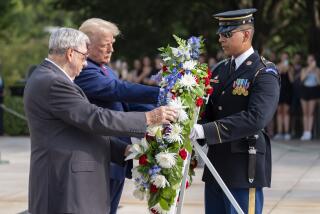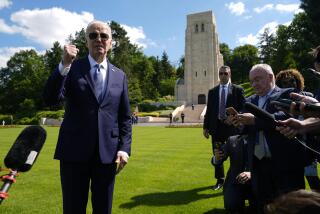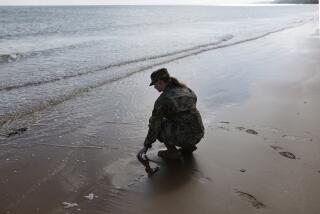Snubbed by French Leaders, Botha Visits Cemetery to Honor S. Africa’s War Dead
- Share via
PARIS — President Pieter W. Botha of South Africa, snubbed even more by the conservative leaders of France than by their Socialist predecessors, traveled Tuesday to a cemetery in an old battleground in northern France to honor his country’s war dead, especially those who fought and died on French soil during World War I.
Botha, who failed to gain an audience with any ranking French official, came to France on a 48-hour private visit so low-keyed that most French might have ignored it if it were not for the loud protests.
In the most spectacular and dangerous protest, an extreme leftist organization called Direct Action before dawn Tuesday bombed the Paris offices of three companies that it said do business with South Africa. One person was slightly wounded in the attacks.
Ironic Switch
Ironically, when Botha came to France two years ago to lay a foundation stone for the cemetery museum in honor of the war dead, Premier Jacques Chirac, then the main opposition leader to the Socialist government, protested that the Socialists sent only the secretary of veteran affairs to welcome Botha.
But no one even that important welcomed Botha when he arrived Monday at Orly Airport outside Paris or joined him for the ceremonies dedicating the museum at the cemetery in the village of Longueval, 100 miles north of Paris.
Both the present secretary of veteran affairs and the prefect for the Longueval area announced they were too busy. Instead, a low-ranking protocol officer welcomed Botha at the airport, and a deputy prefect joined him at the cemetery.
‘Would Not Understand’
Chirac recently said that French authorities could profit by taking advantage of Botha’s visit to impress upon him France’s concern about the racial situation in South Africa. However, the premier also said “our African friends would not understand such an initiative.”
Both Chirac and President Francois Mitterrand are flying to Togo this week for the annual summit between France and the French-speaking African countries.
Many French suspected that Botha was using the pretext of a cemetery visit to demonstrate that South Africa could break out of its increasing isolation and show that it is not a world pariah.
Le Monde, the influential Paris newspaper, accused him of engaging in “the diplomacy of cemeteries.” The dead who fell in World War I have such a hallowed place in French history that no French government would ever try to prevent Botha from coming to France to visit the cemetery, especially on Armistice Day.
Two Interruptions
At Longueval, the ceremony was interrupted twice. First, an anti-apartheid demonstrator shouted “If you respected the soldiers . . .” and then was hurried away before he could finish the sentence. Later, rightists jeered the failure of Chirac to meet with Botha. “Poor France,” they shouted when the deputy prefect stepped forward on behalf of the French government to put a wreath on a memorial at the cemetery.
“We stand here today,” Botha said in a short address, “to honor the death of those South Africans who gave their last full measure of devotion to what they believed was right and in the interest of freedom.
“It is a clear signal of our determination not to lose our commitment to freedom gained over many centuries on countless battlefields.”
Hundreds of French police, trying to protect Botha and to keep demonstrators far away, were scattered through the woods and fields of the valley where the World War I battle of the Somme was fought.
A few dozen demonstrators, chanting “Botha, murderer!” were forced to stay behind police lines two miles from the ceremony. Several thousand demonstrators, sponsored by various trade unions, had marched in Paris last week in protest against the visit.
During a six-day battle near Longueval in July, 1916, the South Africans lost 1,007 of the 1,150 troops that fought there. Botha, however, dedicated the new museum and a memorial on the cemetery not only to those men but to 25,000 South Africans who died in the two world wars and in the Korean War.
Botha was accompanied by a large delegation, including his foreign minister, Roelof F. (Pik) Botha, and 200 South African war veterans.
More to Read
Sign up for Essential California
The most important California stories and recommendations in your inbox every morning.
You may occasionally receive promotional content from the Los Angeles Times.










